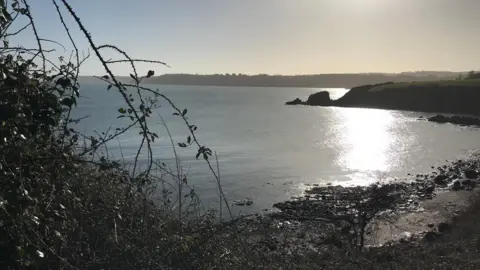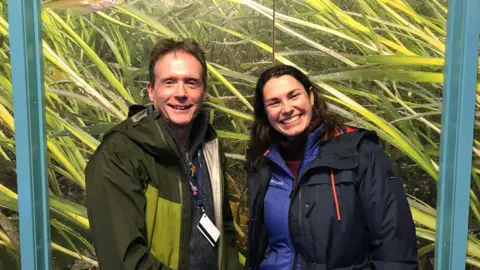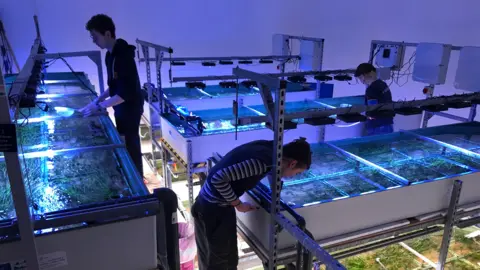How the seas could hold the key to climate change
 BBC
BBCDevon and Cornwall are at the global heart of finding sea-based solutions to climate change thanks to hundreds of scientists in the region, its universities have said.
Their research has included restoring seagrass and oyster beds, looking into seaweed as a sustainable food source, and whether marine fungi can combat disease.
Professor Martin Attrill, from the University of Plymouth, said scientists were working to understand our seas and how to protect them.
"When you look at Devon and Cornwall, and you add up everything we have, we're one of the global leads for marine science," he said.

"We rival anywhere in California, or Australia, or Europe, for the actual amount of knowledge that is coming from this one region," he added.
Professor Attrill's research in marine ecology encourages the re-emergence of seagrass meadows in Jennycliff Bay, around Drakes Island, in Cawsand Bay, and opposite Devonport Dockyard, the university said.
Meanwhile, the University of Exeter said Dr Ruth Thurstan was part of an international collaboration exploring historic oyster beds lost during the Victorian period.
She said: "Oysters really tell us what our seas used to be like.
"In the past, we've discovered that they formed vast reefs, so going back and looking at sources about oysters tell us about the changes our marine environments have undergone as a result of our activities."
She also said the research was helping to establish locations and aims for worldwide oyster bed restoration projects.
'Largest in Europe'
The UK's first large-scale mussel farm is 3km (1.8 miles) off the coast of Sidmouth in Devon.
It was developed with help from Dr Emma Sheehan from the University of Plymouth.
She said: "The way that mussels are grown and harvested is extremely sustainable, and, in addition, they're working hard on all these other environmental benefits - they're filtering our oceans."
Lines of "mussel rope" are fixed to the seabed on a site that could "become the largest in Europe".
Dr Sheehan said their mussel studies began in 2013, with data now showing the species could "restore and regenerate" seabeds.
They also provided "incredible" habitats for species including lobsters, small sharks and rays and cabs.
"We're just now starting to track these animals to understand how they use the farm and whether they're spilling over and having benefits to the local fisheries," said Dr Sheehan.

Research also includes technological innovations, including seaweed as a sustainable food source.
Dr Mike Allen, from the University of Exeter, has founded company SeaGen, saying: "We cannot hang around.
"We need to make a difference and reverse climate change. All big ideas start somewhere.
"All the problems of the world - these global problems – they are all a series of local solutions."
At the Marine Biological Association in Plymouth, Michael Cunliffe is looking at the potential of microscopic fungi in the sea to change our lives on land.
The ocean can serve as a "carbon sink", absorbing atmospheric carbon dioxide to slow the rate of global warming.
"The carbon cycling of the ocean is critical and it really matters for everybody on the planet," he said.
"Fungi certainly have a role in processing of carbon in the marine environment."
He also said he was investigating whether marine fungi might offer some help in countering viruses and and so-called superbugs - drug-resistant infections.
Dr Ed Gasson at the University of Exeter is part of an international and interdisciplinary group of researchers exploring Antarctic ice sheets.
"It's incredible that... [a] beach here in north Cornwall actually tells us something about what was going on in Antarctica in the past – and in the future as well," he said.
The scientists' work is the subject of a new series developed and presented by Anna Turns from The Conversation, in partnership with BBC Radio Devon.
Follow BBC Cornwall on X, Facebook and Instagram. Follow BBC Devon on X, Facebook and Instagram. Send your story ideas to [email protected].
